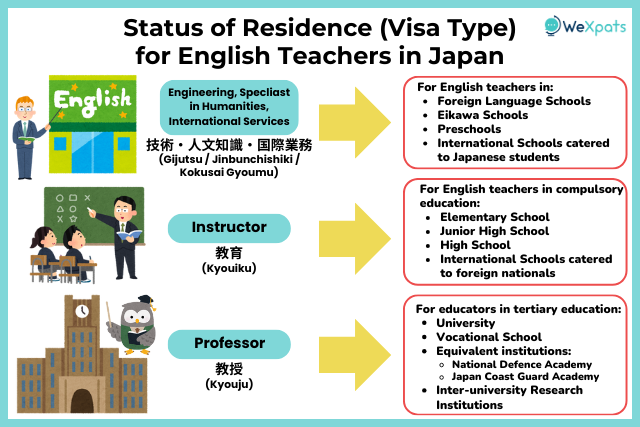Teaching English is one of the most popular jobs for English-speakers in Japan. There are many job opportunities across Japan, and a variety of educational institutions with different teaching styles. Both full time and part time positions are available.
In this article, we introduce all you need to know to become an English teacher in Japan including job requirements, workplace options, visa type, and average salary for English teachers in Japan.
Table of Contents
- Workplace Options for English Teachers in Japan
- How to Find English Teacher Jobs in Japan
- How to Choose Which Type of English Teaching Job to Apply For
- Status of Residence / Visa for English Teachers in Japan
- English Teacher Salary in Japan
- Other English-speaking Jobs in Japan
- Find Teaching Jobs in Japan with WeXpats
 Are you having any issues with job-hunting in Japan?
Are you having any issues with job-hunting in Japan?
Workplace Options for English Teachers in Japan

English teachers in Japan have a variety of workplace options, including public schools, foreign language schools, Eikaiwa, vocational schools, universities and private tutoring. Each option has its own advantages and challenges, catering to different preferences and career goals. Before deciding where to work, check carefully as salaries, working conditions and job requirements may vary.
Foreign Language School (語学学校 (Gogaku Gakkou)
Foreign language schools (語学学校, Gogaku Gakkou) are private educational institutions that specialise in teaching foreign languages to students of all ages and proficiency levels. These schools may specialise in one foreign language or offer several foreign language programmes, such as English or Chinese. They cater to individuals who want to improve their foreign language skills for various purposes, like academic study, study abroad, work, travel, or personal interest.
Depending on the language school, classes may be taught fully in English, or explanations are required in Japanese. The latter requires a certain level of Japanese proficiency, so check the job description and teaching methods carefully before applying for the job.
Eikaiwa School (会話教室)

Eikaiwa (英会話教室. Eikaiwa Kyoushitsu) refers to English conversation schools in Japan, also called 英会話スクール (Eikaiwa Suku-ru) in Japanese. The teaching style in Eikaiwa is primarily learning English through conversation practice rather than formal study methods. The goal for Eikaiwa English teachers is to help students improve their English communication skills.
International School (インターナショナルスクール・国際学校)
International schools (インターナショナルスクール, Inta-neshoru Suku-ru・国際学校, Kokusai Gakkou) in Japan are educational institutions that cater to children of foreign nationalities. Recently, there has been an increasing number of Japanese families who send their children to study in international schools. Aside from English teachers, English-taught subject teachers are also in demand. The required teaching qualification for positions greatly depends on the international school’s curriculum, so check the job details carefully.
Preschool (プリスクール)

Preschool (プリスクール, Puri Suku-ru) in Japan is very different from preschool overseas. In Japan, preschool is a facility that specialises in teaching English to preschool children (aged 3 to 5 years old). Preschools are separated into three patterns of study - a full English environment, a bilingual Japanese and English environment, and an environment that starts with Japanese but moves on to English as children grow older.
Depending on the facility, an education background in child development or experience working with young children may be required.
Online English School (オンラインスクール)

The popularity of online English schools (オンラインスクール, Onrain Suku-ru) significantly increased in Japan since the outbreak of the coronavirus. An advantage of teaching English online is the ability to remote work. Additionally, working hours are quite flexible as demand for classes are usually in the early mornings or evenings, leaving you free for most of the day.
There are two main ways to work for online English schools; as an employee of the school, or as a freelancer through a commission-based contract. Keep in mind that for freelancers, having stable income is necessary to qualify for status of residence (visa).
Elementary (小学校)・Junior High (中学校)・High (高校) Schools

Since 2020, English education has become mandatory in Japanese elementary schools, leading to a sharp increase in demand for English teachers in Japan. However, in Japan, a Japanese teaching licence is required to teach in elementary (小学校, Shogakkou), junior high (中学校, Chuugakkou) and high schools (高校, Koukou).
Currently, many foreign national English teachers in elementary, junior high or high schools serve as Assistant Language Teachers (ALT) on a non-permanent basis. ALTs assist full-time teachers in foreign language education. Unlike full-time teachers, ALTs do not require a teaching licence. Most ALTs are not employed directly by the school but by a dispatch company that assigns them to schools.
University (大学)

There are also job opportunities as professors, associate professors, or lecturers at Japanese universities (大学, Daigaku). What subject you teach can vary widely. It can be foreign language studies in English, or any other English-taught subject at the university. Keep in mind that a university lecturer or professor job typically requires a Masters or PhD degree in the relevant field.
For more about teaching jobs at Japanese universities, check out this article.
Writer's Pick
How to Choose Which Type of English Teaching Job to Apply For
One of our team members worked as an ALT for 7 years, so we asked how and why she chose to be an ALT compared to other options.
These are the things she considered. (Note: She was hired from abroad. The experience of being hired as a resident in Japan may be a little different, but similar things should be considered.)
Are you willing to go anywhere in Japan?
Some companies have branches/assignments across the country and will assign you to where there’s an opening. Our team member wanted to work in Tokyo, so she interviewed for companies that dispatch teachers only in the Tokyo area.
What age group do you want to work with?
In an English conversation school, you could have a range of students, from a young age to working adults, to even retirees. A preschool would mean not only teaching English but taking care of young children, doing more singing and interactive activities. Teaching University or business English means working with adults - perhaps less strenuous in terms of the teaching, but may mean adjusting the curriculum more based on the students’ level.
Do you need a teaching credential or Japanese language ability?
Certain types of English teaching jobs don’t require a teaching degree or credential (but may have other requirements such as graduating from university, or having received native level English education) while others do. This is the same for Japanese language ability - many do not require it, but there may be some where it will be helpful or even required for bilingual communication.
Do you want weekends off? What about weekday nights?
As an English teacher assigned to a public (or even private) school, there’s a high chance you get weekends off. When teaching outside of public schools, there’s a high chance of working weeknights and weekends (or at least one day of two) because that’s when most of your students are available. But it means having a weekday off and possibly starting later in the morning.
When do you want to take vacations?
People who work in public schools have holidays that correlate with the school year - for example, the month of August for summer break. This may mean having a month off - depending on your contract, it may mean that you don’t get paid as you are not working that month. However, that much time off is rare in other jobs in Japan, so many take that time to travel, including visiting their home country. On the other hand, it may be difficult to take longer vacations during the school year.
There are other things to consider as well, and not all English teaching experiences are the same, even within the same type.
How to Find English Teacher Jobs in Japan

Apart from applying directly to educational institutions offering English teaching positions, there are other ways to find English teacher jobs in Japan. Here are some of them.
JET Programme
The Japan Exchange and Teaching Programme (JET Programme) is an initiative by the Japanese government that invites university graduates from around the world to live and work in Japan. The primary goal of the JET Programme is to promote international exchange. the Ministry of Internal Affairs and Communications, the Ministry of Foreign Affairs, the Ministry of Education, Culture, Sports, Science and Technology, and the Council of Local Authorities for International Relations.
Participants in the JET Programme can work in Japan as an Assistant Language Teacher (ALT), Coordinator for International Relations (CIR), or Sports Exchange Advisor (SEA). Employment as an ALT is initially for one year, but may be extended up to five years with recognition of good performance and capabilities by the employing organisation. Many foreign nationals who have completed their tenure as ALTs under the JET Programme go on to work for Japanese companies.
Although the competition is fierce and positions are limited, if you are interested, then check for recruitment announcements typically made through Japanese embassies or consulate offices around October and November each year.
Job Sites for Foreign Nationals in Japan
We also recommend using job sites that specialise in foreign national employment. These sites have more job openings for English teachers, and jobs are easier to apply for. There are many services that allow you to filter job openings by Japanese language level, or have multilingual support.
Japanese Recruitment Agency
For further ease and convenience in job hunting, consider using a recruitment agency. A career advisor will recommend job openings that match your qualifications and desired conditions. Some recruitment agencies also provide resume correction and interview guidance. This is especially recommended for those who are looking for a job in Japan for the first time.
Read more about how to use Job Sites and Japanese Recruitment Agencies in Japan.
Status of Residence / Visa for English Teachers in Japan

The type of status of residence (visa) required depends on your workplace as an English teacher. Below, we introduce the different types of visas for English teachers in Japan and the conditions necessary to obtain them. Be careful to apply for the correct visa type.
Engineering / Specialist in Humanities / International Services (技術・人文知識・国際業務, Gijutsu / Jinbunchishiki / Kokusai Gyoumu)
The “Engineering / Specialist in Humanities / International Services” status of residence (visa) is required to work as an English teacher in foreign language schools (語学学校), Eikaiwa schools (会話教室), and preschools (プリスクール). Of the three fields, English teachers fall under the category of “International Services).
The requirements for obtaining the “Engineering / Specialist in Humanities / International Services” status of residence (visa) is as follows:
- Graduated from university, or 3+ years work experience as an English teacher
- Receive compensation equal to or higher than a Japanese national working the same job
The above requirements must be fulfilled if you come from an English-speaking country. Your academic background does not need to be a major in English, it is sufficient as long as you have a degree.
If you come from a non-English speaking country, then your status of residence (visa) category would be “Specialist in Humanities” instead. Your application will be assessed more strictly as well.
Instructor (教育, Kyouiku)
The “Instructor” status of residence (visa) is required to work as an English teacher in compulsory education, such as at elementary/junior high/high schools (小学校・中学校・高校) and international schools (インターナショナルスクール・国際学校). However, the requirements differ depending on whether you work for elementary/junior high/high schools or international schools.
The requirements for obtaining the “Instructor” status of residence (visa) is as follows:
For Elementary / Junior High / High Schools
- Graduated from university or received education equivalent to or higher than university
- Completed a specialised course at a Japanese vocational school, and majored in a subject relevant to the education to be provided
- Acquired a teaching licence in the education to be provided
In addition to any one of the above, you must also…
- (For English, etc. foreign language teachers)
Have received 12+ years of education in the foreign language to be taught - (For subject teachers)
Have 5+ years teaching experience in the relevant subject - Receive compensation equal to or higher than a Japanese national working the same job
For International Schools
- Graduated from university or received education equivalent to or higher than university
- Completed a specialised course at a Japanese vocational school, and majored in a subject relevant to the education to be provided
- Acquired a teaching licence in the education to be provided
In addition to any one of the above, you must also receive compensation equal to or higher than a Japanese national working the same job. These are the conditions for working at an international school for children of foreign nationality. For international schools that mainly cater to Japanese students, you will need the above-mentioned “Engineering / Specialist in Humanities / International Services” status of residence (visa).
Professor (教授, Kyouju)
The “Professor” status of residence (visa) is required to work as an educator in tertiary education.
The requirements for obtaining the “Professor” status of residence (visa) is as follows:
- Work at tertiary level institutions, such as universities, junior colleges, graduate schools, research institutions, vocational schools, or any education institution recognised as equivalent to universities, inter-university research institutions, and institutions equivalent to universities.
- Receive compensation equal to or higher than a Japanese national working the same job
Academic background is not included in the requirements for obtaining the “Professor” status of residence. This is because it is assumed that a person has a certain level of educational background at the time they are hired by a university or other institution. The screening process will mainly check whether the main place of work meets the conditions.
Institutions equivalent to universities include the National Defence Academy and the Japan Coast Guard Academy. Inter-university research institutions refer to the National Institute of Japanese Literature, the National Institute of Genetics, and the National Astronomical Observatory of Japan.
※ Immigration Services Agency (ISA), “在留資格「技術・人文知識・国際業務」”, “在留資格「教育」”, “在留資格 「教授」”
English Teacher Salary in Japan

The average annual salary for full time English teachers in Japan is around 3 to 3.5 million Yen a year, or 250,000 to 300,000 Yen a month. The starting salary for full time English teachers is on average around 2.4 million Yen a year. For part time English teachers, the average salary is around 1200 Yen an hour, and for dispatch English teachers, the average salary is around 1500 Yen an hour.
Factors that greatly affect English teachers' salaries in Japan include workplace and contract type. In the case of the workplace, tertiary-level educators earn much higher salaries. The average salary for university professors is around 10 million Yen a year, while university lecturers earn on average 8 million Yen a year. Those who contribute to research and writing will be rewarded accordingly. Salaries for the different positions of assistant professor and associate professor also vary.
For contract types, there is a considerable difference between full time teachers and contract teachers, with full time teachers earning on average 2 million yen a year more than contract teachers. As for part time teachers, the average salary may be 1200 Yen an hour, but can range from 1200 Yen to 5000 Yen an hour depending on the workplace.
Other English-speaking Jobs in Japan

What other jobs apart from English teacher are available to English-speakers? There are several career options available, and even more job opportunities if you have Japanese language proficiency. Here are some English-speaking jobs you can find in Japan.
- Translation Jobs
- Interpreter Jobs
- Localisation Jobs
- University Jobs
- Call Center Jobs
- Recruitment Jobs
- Tourism Jobs
- Hotel Jobs
and more.
Find Teaching Jobs in Japan with WeXpats Japan

WeXpats operates a service for foreign nationals who want to work in Japan. There are jobs in a variety of industries including education and teaching jobs. There are 2 services available on WeXpats - WeXpats Agent for full time jobs and WeXpats Jobs for part time jobs.
Looking for a Full Time Position? Leave it to WeXpats Agent!
WeXpats Agent is a career support service that specialises in employment for foreign nationals living in Japan.
Recruitment agencies in Japan are a service where dedicated career advisors will assist you with your job hunt for free. In addition to introducing open positions, we also provide support to help you create your Japanese resume and practice for interviews. Worried about job hunting in Japanese? We are here for you.
Features of WeXpats Agent
-
We have many job openings that are a good fit for foreign nationals to work in, such as translation, interpretation, inbound, etc. jobs that make use of your language skills, as well as engineering etc. jobs that do not require Japanese skills.
-
Our career advisors support and help you prepare your resume and practice job interviews with you. Clearly communicate your strengths to the hiring company.
-
We will handle communication with companies on your behalf, such as arranging interview dates and negotiating conditions. And thereby reducing your stress and time spent.
Finding a Part Time Job? Browse on WeXpats Jobs!

WeXpats Jobs is a part time job site for foreign nationals living in Japan. You can search for jobs in 11 languages (English, Vietnamese, Korean, Indonesian, Traditional Chinese, Simplified Chinese, Burmese, Thai, Spanish, Portuguese), including Japanese. Find jobs that suit you by specifying your Japanese language level, occupation, location, and etc.
※ You can register from outside Japan, but only those living in Japan can apply for jobs.


































